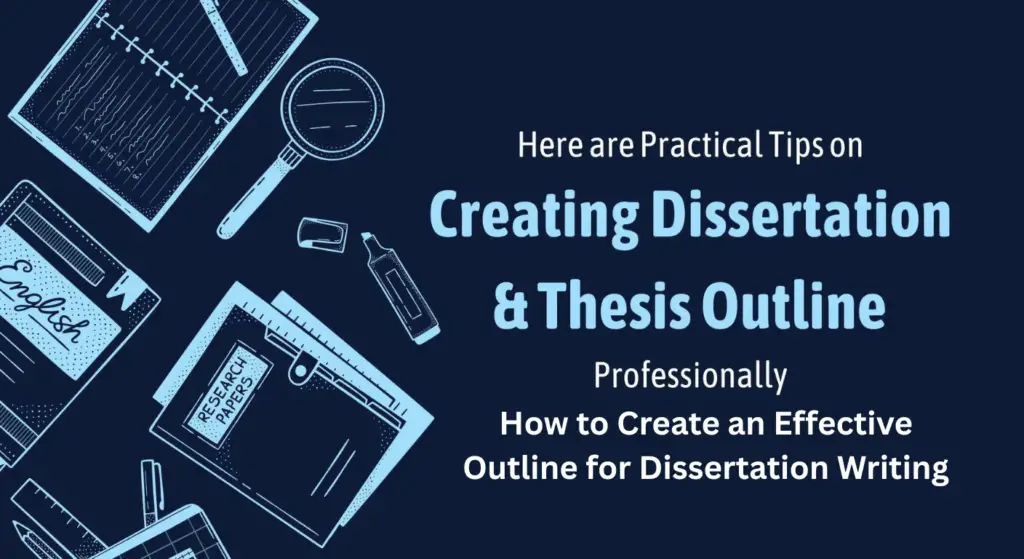Why a Dissertation Outline Matters
When it comes to writing a dissertation, many students underestimate the power of a well-structured outline. A clear and organized outline helps you:
-
Stay focused and on track
-
Avoid repetition and gaps
-
Save time during writing and editing
-
Communicate your ideas effectively to supervisors
For students seeking the best online dissertation writing help, many experts and professionals, including those offering a top-rated Criminology Dissertation Service, recommend starting with a strong outline.
Key Components of an Effective Dissertation Outline
Creating a successful dissertation outline means understanding the standard components your university or academic field expects. While formats vary slightly across disciplines, a typical structure includes:
Introduction
This is where you introduce your topic, research question, and objectives. Include:
-
Research background
-
Problem statement
-
Purpose and significance
-
Research questions or hypotheses
An outline will help you identify how each part logically connects, ensuring a coherent narrative.
Literature Review
The literature review examines existing research and identifies gaps. A detailed outline for this section may include:
-
Overview of theoretical frameworks
-
Key studies and findings
-
Methodological trends
-
Gaps in the literature
Using top dissertation writing services or consulting with academic professionals can help refine this section for stronger arguments.
Methodology
Here, you’ll detail how you plan to conduct your research. Your outline should cover:
-
Research design (qualitative, quantitative, or mixed methods)
-
Data collection methods
-
Data analysis strategies
-
Ethical considerations
Experts offering online dissertation help often emphasize clarity and feasibility in the methodology outline.
Results
Even if you haven’t collected data yet, outlining this section prepares you for future analysis. Consider:
-
Type of data to be reported
-
Tables or graphs to be included
-
Summary vs. detailed reporting
Discussion
This section interprets your findings about your research questions. Your outline should plan for:
-
Explanation of findings
-
Comparison with existing literature
-
Theoretical implications
-
Practical applications
Conclusion and Recommendations
Finally, conclude with a summary of your study, its limitations, and suggestions for future research. A strong outline here will:
-
Reinforce your main findings
-
Emphasize contributions to the field
-
Suggest actionable recommendations
Step-by-Step Guide: How to Create an Effective Outline for Dissertation Writing
Step 1: Understand Your University’s Guidelines
Before you start, review your institution’s formatting and structural requirements. Some universities provide templates or example outlines, which can offer helpful guidance.
Step 2: Start with Broad Sections
Begin by listing the main sections discussed above. Use these headings to guide your research and writing. Starting broad helps avoid getting lost in the details too soon.
Step 3: Break Down Each Section
Next, divide each major section into subheadings. For instance, under “Methodology,” break it down into “Data Collection,” “Sampling Methods,” and “Ethical Approval.”
Working with online dissertation experts or professional writing services can help ensure your outline meets academic standards.
Step 4: Organize Your Notes and Sources
Organize your reading materials and notes according to your outline. This makes it easier to integrate citations and references in the right sections.
Using top online tools and academic services can also streamline this stage.
Step 5: Stay Flexible
Outlines are not rigid. As you dive deeper into your research, you may need to adjust your structure. Flexibility is key to effective dissertation writing.
Many experts recommend revisiting your outline regularly to ensure it still aligns with your research direction.
Tools to Help You Create a Dissertation Outline
Several online tools and services can make creating a dissertation outline easier. Some popular options include:
-
Trello or Notion – Great for visual organization and task tracking
-
Scrivener – Built specifically for long-form writing projects
-
Google Docs or Microsoft Word: Simple, accessible, and collaborative
-
Online academic writing help platforms – Offer outline templates and consultation with professionals
By using these tools, you can stay organized, collaborate with mentors, or even seek expert services for specific sections.
Common Mistakes to Avoid in Your Dissertation Outline
Even with the best intentions, students often make a few avoidable mistakes:
1. Being Too Vague
Each heading and subheading in your outline should provide specific direction. Avoid general statements like “Talk about research.”
2. Skipping the Literature Review Outline
This section deserves its detailed structure. Don’t assume you can summarize it in one paragraph later.
3. Ignoring Feedback
If your supervisor provides comments on your outline, don’t dismiss them. Incorporating expert advice early can save you from major revisions later.
4. Not Updating the Outline
Your research will evolve, and your outline should evolve with it. Update your plan regularly to reflect new insights.
Getting Help from Professionals and Experts
If you find yourself stuck, consider reaching out to top dissertation writing experts online. These professionals can offer:
-
Outline templates tailored to your subject
-
Personalized guidance and feedback
-
Editing and proofreading services
-
Chapter-specific writing support
Working with a professional dissertation writing service ensures your work remains on track and up to academic standards. It also helps reduce stress and improve productivity.
Final Thoughts
Why Your Outline is Your Dissertation’s Backbone
A solid outline sets the tone for your entire dissertation. It keeps you focused, organized, and aware of how each piece fits into the bigger picture. Whether you’re writing independently or seeking help from top experts and online services, the value of a clear and logical outline cannot be overstated.
How to create an effective outline for dissertation writing is not just a question of format it’s about making your writing process smoother, your arguments stronger, and your outcome more successful.



lkjdretlvssss http://www.yandex.ru
580xcy